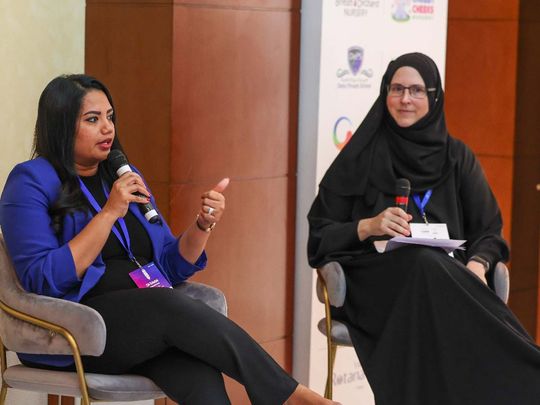
Introducing children to STEM (Science, Technology, Engineering and Mathematics) education at an early age equips them with essential life skills and knowledge to succeed in a technology-driven world, panellists at Gulf News Edufair highlighted.
STEM education not only opens doors to various career paths but also fosters creativity, innovation, and critical thinking—key skills for students to thrive in a rapidly changing world. Realising the importance of exposing learners to STEM experience from an early age, schools in the UAE have started implementing various innovative approaches to teaching.
“It’s best to start STEM education in the early years as children are naturally curious and less inhibited than older children. At this stage, children are more willing to innovate, question, experiment, make mistakes and learn from them,” explained Sara Hollis, Principal, American School of Creative Science, Nad Al Sheba, during a panel discussion titled STEM starts early: Fostering a love of science and technology in young learners.
“By teaching them to take risks in learning through STEM education, we help instill a growth mindset in them which they carry with them as they advance through grade levels,” she added.
Panellists at Edufair recommended adopting an interdisciplinary approach to STEM education, which involves integrating concepts from different fields of study. This allows students to see the connections between various subjects and apply their knowledge in unique ways.
“Concepts of STEM can be embedded into various subjects across the curriculum, including math, language, arts and creativity, and social studies. STEM learning helps cultivate crucial life skills such as problem solving, critical thinking, reasoning, and innovation, and most importantly, resilience,” said Rajani Nalla, Founder & CEO, Trusity Innovations Learning.
“Resilience and perseverance are qualities that enable children to follow through with tasks and not give up easily. Engaging children in project-based and challenge-based learning using STEM approaches helps instill these skills in them, ensuring success in whatever future careers they pursue,” Nalla said.
While children love to experiment with materials, play with numbers, work on puzzles and explore their environments independently in infancy and early years, they sometimes lose interests in subjects that involve numbers or demand their critical thinking and problem solving skills, as they go up in school.
Traditional teaching methods and learning facts by rote are the some of key reasons why children sometimes lose grip in science and maths, thereby losing out on a host of lucrative career options in science and technology, panellists pointed out.
“Hands-on, experiential learning helps children connect complex concepts of STEM subjects with real-life scenarios. Children respond well to technologies so integrating technological tools into classroom instruction can create immersive learning environments, increasing engagement with the subjects,” explained Nalla.
Regularly reviewing and updating the curriculum is crucial to keep students engaged, pointed out Hollis.
“If the curriculum isn't relevant, children may lose interest in STEM subjects. Schools should also collaborate with industries to create opportunities for students to interact with STEM role models. This fosters interest and enthusiasm in the subjects,” Hollis added.












